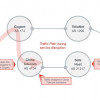How vulnerable is the Internet to Terrorists - More at risk then you thought
There are ONLY 13 root servers, dispersed throughout the world which serve as the key way stations in the routing of Internet messages and other traffic. When a Web browser tries to reach a site such as www.yahoo.com, it has to ask the root server to locate the corresponding Internet protocol address -- a string of numbers that is, in Yahoo's case, 204.71.200.33.
"The 13 computers represent a pretty clear target for attack," said Karl Auerbach, an ICANN board member. Though temporary root server failures have not downed the Internet in the past, the Internet could be disabled over a period of time -- possibly a week -- if all the servers were to fail simultaneously, Auerbach said.....
Internet Vulnerable to Terrorists, Experts Warn
By Dina ElBoghdady Washington Post Staff Writer
This month's terrorist attacks prompted one of the Internet's leading regulatory bodies to start exploring how to secure the electronic naming system critical to routing Web traffic and e-mail.
The Internet Corporation for Assigned Names and Numbers (ICANN), a nonprofit group created by President Bill Clinton in 1998 to oversee the Web address system, will devote its annual meeting in November to an "in-depth assessment" of the issue, Stuart Lynn, the group's president and chief executive, said in a statement this week.
The announcement provided no details on the group's agenda. But many security experts expect ICANN to focus on the 13 root-name servers, or computers, that contain hundreds of Internet suffixes, such as ".com" and ".net" and ".org."
The results would be disastrous, especially for the corporate world, which relies heavily on online payments and other transactions, said Marc Maiffret, chief hacking officer for eEye Digital Security in Aliso Viejo, Calif.
"If the Internet went down for a single day, it would be an immense amount of money lost," Maiffret said. "It would break the backbone of communications that most modern companies depend on."
The Internet was designed so that no single point of failure could cripple the whole system, Maiffret said. While half of the root servers are located in the United States, buildings that once served as Internet hubs are no longer located in a few central places, Maiffret said.
But that's no protection against computer viruses, such as the Nimda worm that infected millions of computers worldwide earlier this month, clogging Internet traffic, Maiffret said.
If terrorists were to direct a worm to attack root servers, they could effectively make the Internet inaccessible to the average person, who would have to know a numerical address, rather than an easy-to-remember name, in order to reach a Web site.
ICANN oversees the institutions that manage and house the crucial root servers. As a result, it can demand better security, more frequent and comprehensive backups, and more accountability from those organizations, said analysts who closely follow ICANN's actions.
SNP.









































































